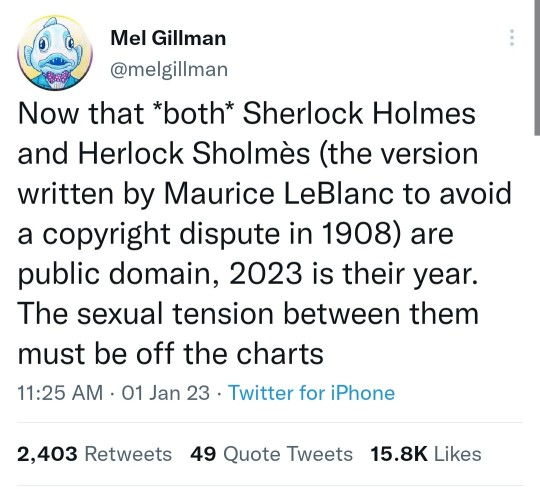#not sherlock holmes
Text
The Man with the Watches
Originally written in 1898 as part of a series of short stories called Round the Fire. Doyle needed money to complete a house he was building in Surrey. Insert your own jokes about actors, bad movies and extensions here.
Rugby is a town in Warwickshire, 83 miles north of London. Yes, it is where the sport of rugby is named after - more specifically Rugby School, a famous private school.
Smoking areas in British trains were gradually abolished from the 1980s, the final ones going in 2005 (GNER and Caledonian Sleeper). I have a 2000 GB-wide timetable showing where smoking was still permitted. In some cases, the trigger for the ban was the move to air-conditioned stock that would result in the smoke circulating in the rest of the train.
A Gladstone bag was a rigid-framed small suitcase that could be opened into two equal halves, named as such due to its used by William Gladstone, four-time British Prime Minister, who would start his final ministry later in 1892.
The guard's van on passenger trains was generally a specific section of a carriage that also had a caged area for carrying luggage, parcels and caged small animals.
Willesden Junction is located in Harlesden, NW London. It no longer has any platforms on the West Coast Main Line, with Avanti and London Northwestern Railway trains going straight past it. Its passenger service today is made up of London Overground Lioness line services from Euston to Watford Junction, Overground Mildmay line services from Stratford to Richmond or Clapham Junction and the Underground's Bakerloo Line from Harrow and Wealdstone to Elephant & Castle. The first and third share the same tracks, while the second operates, on lines shared with freight trains, on separate "High Level" platforms. There is a depot for Overground trains nearby.
Non-gangwayed stock i.e. carriages with no connection between them even for emergency use, continued to be built into the British Railways, with quite a few of the "first generation" of diesel and electric multiple units being built this way. Most got gangways in later refurbishments, but the Class 205 DEMU, bar one example (205205) altered in a refurbishment trial, would carry on without them until final withdrawal in 2004. Most of the survivors then promptly ended up in the hands of heritage railways.
The Bible Society of London was founded in 1804 with the aim of providing affordable Bibles in people's own languages, after the 1800 case of a woman called Mary Jones, who saved up for six years then walked 26 miles to buy a Bible in Welsh. It is still active today.
The London to Rugby line had been widened to four tracks in the 1870s. From west to east, the tracks go: Down (Northbound) Fast - Up (Southbound) Fast - Down Slow - Up Slow. Ergo, you cannot move between two Down trains without a big leap. (https://www.opentraintimes.com/maps/signalling/lec2#LINK_1)
A bunco-steerer is a swindler.
Green goodsmen operated a scam in which people were offered purportedly counterfeit notes printed using stolen plates (so appearing genuine) at a cheap price, being shown actually genuine notes in a bag. During negotiation, the bag was switched for one containing worthless goods, like sawdust or green paper. Having been duped out of real money, the victims were reluctant to report this to police as attempting to purchase fake money was illegal.
Card-sharping is cheating at cards using various means, including cutting bits of cards to mark the ones you would want. Vegas casinos frequently deliberately cut corners off used cards being sold to tourists to prevent them being snuck into their games.
Tammany refers to Tammany Hall, the corrupt political machine that had ran New York City, for much of the 19th century, leveraging support from Irish immigrants by providing them with jobs for example. It had been temporarily ousted from power after the Lexow Commission of 1894-95 into police corruption; to wit, promotions were being sold for large sums of money and officers got that through extracting protection money from brothels etc. However, it would come back in the 1898 elections and retain control with occasional breaks until 1961, when Carmine DeSapio was ousted as its leader. It then lost power and had gone by 1967.
Travelling salespeople would carry samples or models of their products on their trips, sometimes in branded containers. This has largely become a thing of the past, but is still around.
Northumberland Avenue used to have a lot of high-class hotels, but these have mostly gone. Some were taken over for government use for a while, including by the War Office.
"Mary Jane" appears to have been a slang term for a male prostitute; Mary Jane Kelly was the final victim of Jack the Ripper.
#letters from watson#the man with the watches#arthur conan doyle#not sherlock holmes#allegedlyhist#history#factoids
18 notes
·
View notes
Text
Everyone gives Sherlock Holmes a hard time about being mean about Watson's writing, but honestly imagine you told your roommate "sure, you can write up an account of my work for the newspaper," thinking it would be like, about the murder, but then he publishes it and it's 90% about you, as a person, and it's a huge hit and now everyone in London knows that you hoard newspapers and do cocoaine when you're depressed. Because I think you'd be little miffed too.
71K notes
·
View notes
Text
When I was a very tiny child my mom was in a local production of The Reluctant Resurrection of Sherlock Holmes, a play where Arthur Conan Doyle is hired to investigate a murder at a haunted house with Sherlock Holmes, a figment of Doyle’s imagination that only he can see and hear. Doyle very sincerely believes that the house is haunted, and Holmes thinks that Doyle is a moron
I was too young to appreciate this concept when I was a child, now that I’m older it’s the best concept for a play I’ve ever heard in my life.
15K notes
·
View notes
Text
“lol Arthur Conan Doyle clearly didn’t know anything about drugs. Sherlock Holmes did cocaine but it calmed him down. That’s not how cocaine works!”
There are two options: Arthur Conan Doyle had never met someone addicted to cocaine or he met some with ADHD who was addicted to cocaine
31K notes
·
View notes
Text
Fun Fact: in one month (1/1/23), all Sherlock Holmes stories hit the public domain and the Conan Doyle Estate can't do shit! I say this for absolutely no reason but also congrats in advance to the happy couple.
110K notes
·
View notes
Text
Hello, Sherlock Holmes adaptation writer. I have trapped you in this room. It is fully furnished and comfortable. On the table, you will notice a copy of A Scandal in Bohemia by Sir Arthur Conan Doyle, of which redistribution is perfectly legal, as the work is in the public domain. You will notice it is rather thin. You have 24 hours to read the approximately 8,550 words in this story. To exit this room, all you must do is summarize the plot of the story without referring to Irene Adler as a seductress or implying she is attracted to Sherlock Holmes. Good luck.
#saw trap meme#jigsaw trap meme#sherlock holmes#a scandal in bohemia#irene adler#adler saw trap post
41K notes
·
View notes
Text

sorry
15K notes
·
View notes
Text

That's my take on them
#bbc sherlock#hilson#house md#gregory house#greg house#sherlock holmes#james wilson#john watson#johnlock#house
27K notes
·
View notes
Text
Excuse me, but I must parade my own ignorance for a moment: there is a book called Round the Red Lamp, written by Sir Arthur Conan Doyle, of which I knew nothing. Of course, I knew that he wrote many works, not all of which were fiction, and that he preferred his own works of non-fiction rather more than he ever preferred Holmes. So it goes with Conan Doyle.
The reason I bring it up, however, is that the preface of Round the Red Lamp (which is a book about the realities of being a doctor) is a defence of showing the more grisly bits of what doctoring is all about. I think it equally applies to most writing, as well, and seems especially apt in today's climate, in either fic or more traditional forms of written work:
[Being an extract from a long and animated correspondence with a friend in America.]
"I quite recognise the force of your objection that an invalid or a woman in weak health would get no good from stories which attempt to treat some features of medical life with a certain amount of realism. If you deal with this life at all, however, and if you are anxious to make your doctors something more than marionettes, it is quite essential that you should paint the darker side, since it is that which is principally presented to the surgeon or physician. He sees many beautiful things, it is true, fortitude and heroism, love and self-sacrifice; but they are all called forth (as our nobler qualities are always called forth) by bitter sorrow and trial. One cannot write of medical life and be merry over it.
Then why write of it, you may ask? If a subject is painful why treat it at all? I answer that it is the province of fiction to treat painful things as well as cheerful ones. The story which wiles away a weary hour fulfils an obviously good purpose, but not more so, I hold, than that which helps to emphasise the graver side of life. A tale which may startle the reader out of his usual grooves of thought, and shocks him into seriousness, plays the part of the alterative and tonic in medicine, bitter to the taste but bracing in the result. There are a few stories in this little collection which might have such an effect, and I have so far shared in your feeling that I have reserved them from serial publication. In book-form the reader can see that they are medical stories, and can, if he or she be so minded, avoid them."
It's an old argument, the one about what to portray in fiction; and it is evident from both this--and, honestly, all of his Holmes collection--that Doyle erred on the side of detail rather than censorship, though it should also be noted he understood the nature of personal discretion as an author in choosing what to portray.
What he seems to get at, though, and puts beautifully in a way I certainly have never been able to articulate, is that everyone finds solace in their own way, and that even the bitterest of pills can have the most remarkable healing effects, even if you don't personally care for bitter pills. That it is good and wise to step outside of your usual habits because what you find could expand your horizons.
The corollary to that, of course, is that people who staunchly refuse to do so, who so stubbornly maintain that they will not engage with fiction which they consider "dark" or "problematic" or anything else is that they are absolutely admitting that they wish to remain small. That they are afraid of changing their ideas of the world; that if their world becomes larger, what does that mean for their place in it, and not just their place, but their size? And you understand that people like that are terribly frightened, not of being small, but being thought of as small. Except that the only way out is through.
Learning can be painful, yes. It often means adjusting yourself to contours you never knew existed and at present, do not fit well. But the end result is that it is a restorative. Stretching yourself in this way, Doyle argues, is healing. In the scores of psychological studies we've conducted since, and the heaps and heaps of anecdotal experiences as well, this has absolutely been borne out. Those bitter pills are necessary to your own well-being.
There is personal discretion in this, too, yes. There are certain pieces of writing we do for others, and those that must remain for ourselves, and there is nothing wrong with that. It does not mean that any dark or uncomfortable material should never see the light of day. Lumping it all together as "bad," "wrong," "problematic," whatever the term au courant is, is antithetical to the human experience. Growth is normal; stagnation is where the unnatural starts.
And, as Doyle very practically points out, if at the end of the day you decide it really isn't for you, you are under no obligation to read it, especially when the author has taken care to inform you that this isn't something you may want to read. After that, it's on you to avoid. Specifically seeking out the content you are trying to avoid and then commenting that it's bad and shouldn't exist when you do find it does not reflect on the author, it reflects on the reader. It so unequivocally, once again, announces how small and poisoned you want the world to be.
This is longer than I ever imagined it would get, so I'll stop there. As a concluding thought, though, I leave you with this: the world is full of difficult and painful things; saying they have no right to exist will not make them go away, and neither will trying to force them out. But it will effect harm to those who might need them the most, and if you're fine with that, then harm reduction is not what you're seeking in the first place. It is to make the world as small as you are, and I want no part of it.
#sir arthur conan doyle#acd#not sherlock holmes#i really should read this book#it sounds like both a fascinating look at his life as a doctor#but also could be useful as a bit of research into the realities of late 19th century medicine#long post
1 note
·
View note
Text
Apparently it is Raffles week, a fact I learned by scrolling through my dash and repeatedly mistaking Raffles fanart for Holmes fanart
5 notes
·
View notes
Text
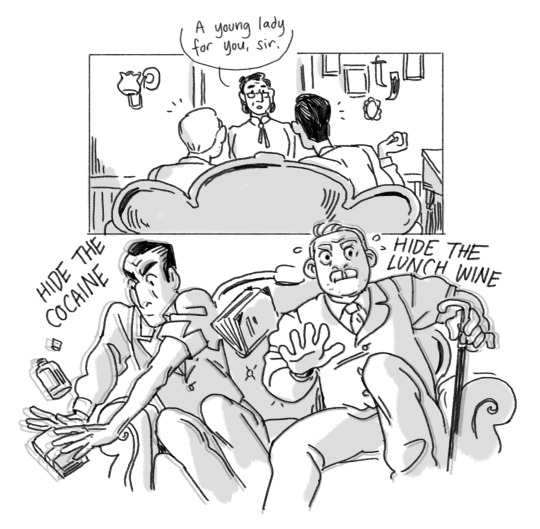
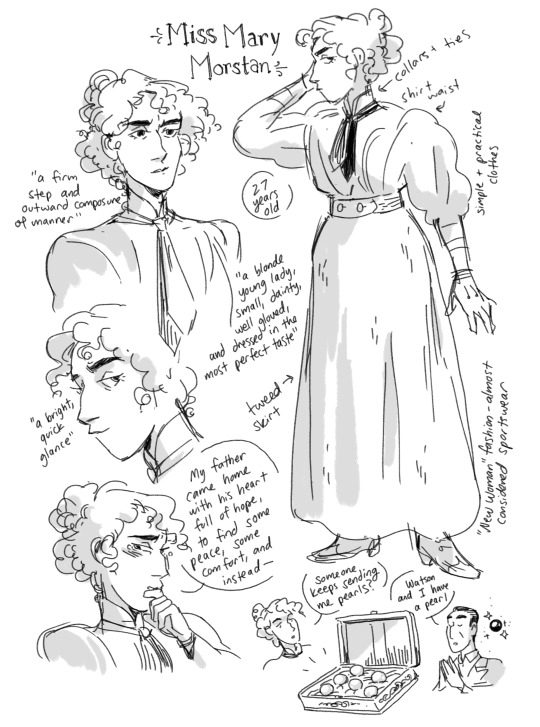
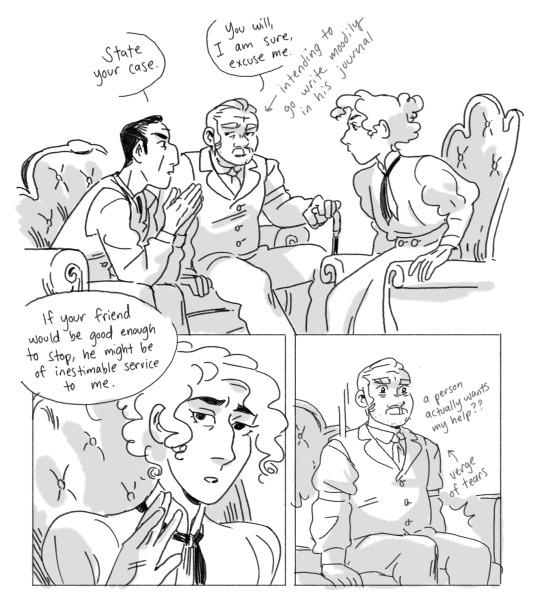
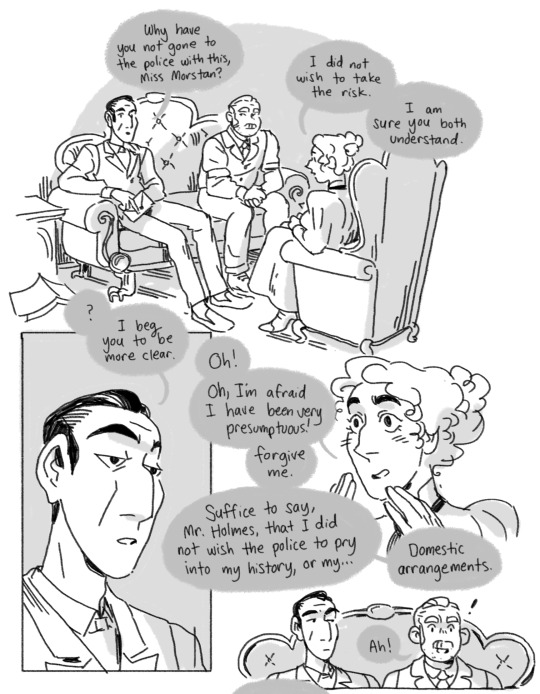
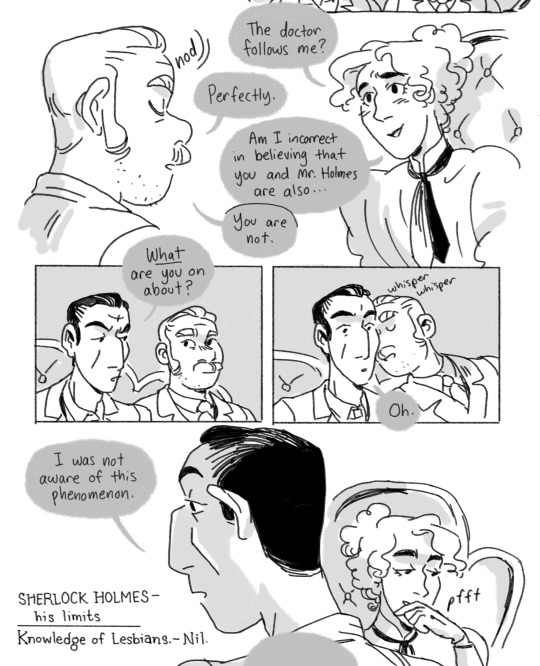
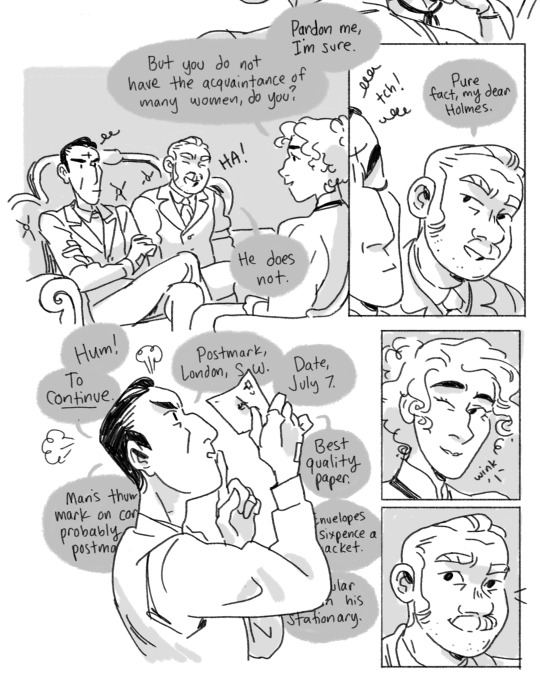
Made myself laugh drawing that first panel...this is part two of THE SIGN OF THE FOUR, part one here!
(this is part of the Watson's sketchbook series)
#lesbian mary morstan has entered the chat#watsons sketchbook#my art#sherlock holmes#john watson#drugs cw#Mary Morstan
5K notes
·
View notes
Text

your cum does not impress me dr watson
7K notes
·
View notes
Text

#james potter#remus lupin#sirius black#wolfstar#the marauders#jegulus#jily#regulus black#the marauders era#the last air bender#zutara#zuko#prince zuko#katara#sherlock holmes#johnlock#vi and cait#arcane#luca×alberto#luca#loki odinson#Loki and mobius#Mary Lily#Darlene#sunseeker#richie and eddie#will and mike#robin and Nancy#stranger things#steddie
5K notes
·
View notes
Photo
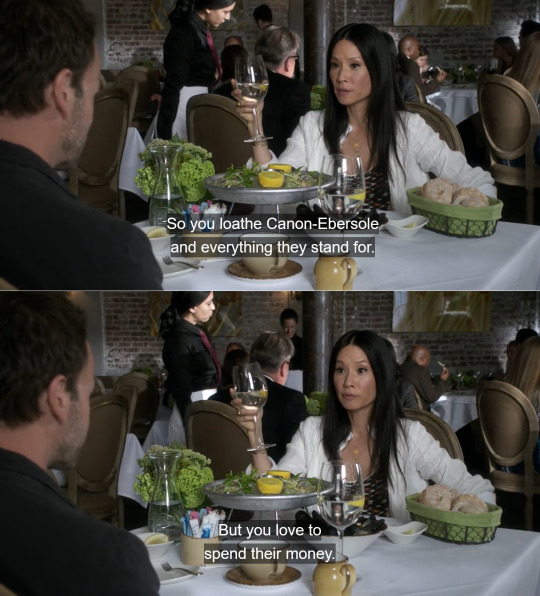
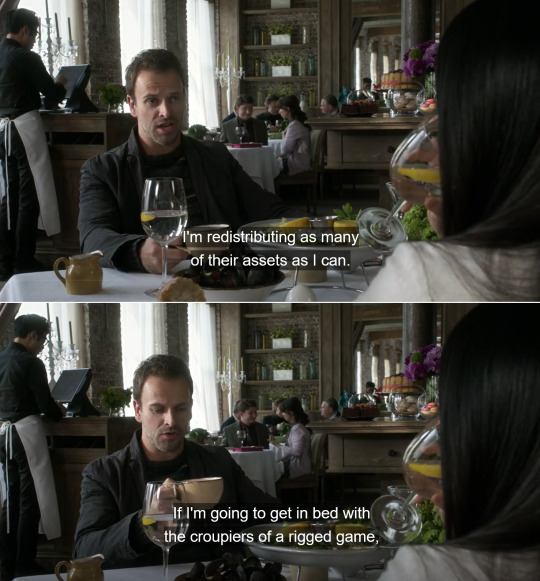
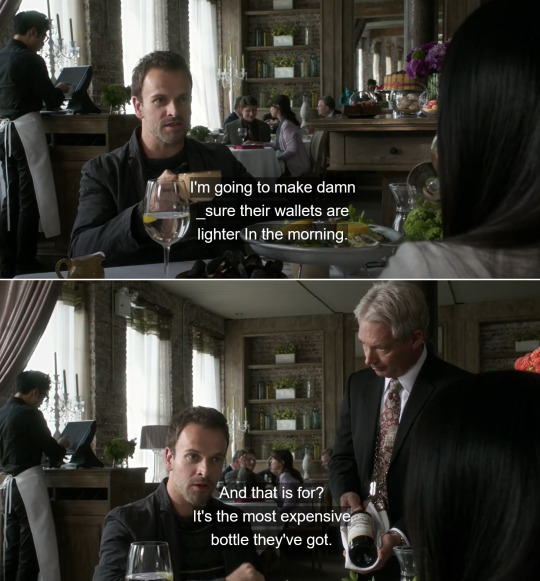

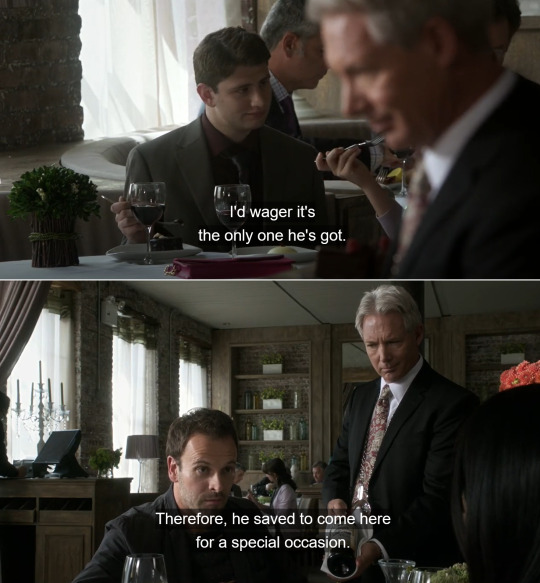



“i wish we could see adaptations where sherlock holmes hates the rich and is allowed to be kind to those around him and uses his abilities to support society’s underdogs” elementary was doing this back in 2012. this was only episode 4.
#sherlock holmes#elementary#joan watson#this show had SEVEN SEASONS#and by its 4th episode holmes and watson had more character depth than a lot of adaptations do in their entire run#this holmes is acd holmes plopped into a modern world and it works so well. SO WELL.
43K notes
·
View notes
Text
Fact: The earliest reliably dated use of the phrase “fucked up” appears in the court records of a US Navy court-martial case from 1863; the way the phrase is used suggests that its meaning was already well known at the time, but this is the first known printed record of it that we can confidently put a date to.
Additional fact: Bram Stoker’s Dracula is set in 1897.
Conclusion: It would not anachronistic for your Dracula fanfic to have a character describe the Count as a fucked up old man.
#media#literature#dracula#bram stoker's dracula#fandom#fanfic#history#language#linguistics#etymology#swearing#sherlock holmes could also say 'fucked up'#he wouldn't#but he could
64K notes
·
View notes
